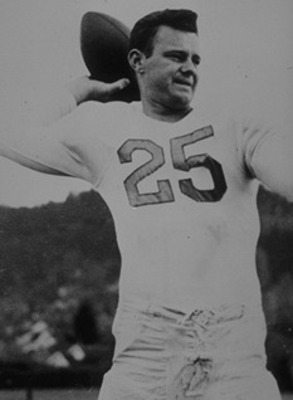So when I recently checked out a copy of "Legacy: 100 Years of Athletics at the University of Nevada," imagine my surprise when I read a passage on a Wolf Pack team from the 40s that upset a favored Oregon Ducks team in Eugene. With this season's opening tilt on all of our minds, I couldn't wait until September for the opportunity to share their story with my readers.
The majority of what you read next can be found in that book, the contents of which are ultimately the property of the University of Nevada Department of Intercollegiate Athletics and author John Trent.
* * * * *
Nevada has played Oregon six times in football. The Ducks have won five of those contests, some of which were close (a 24-20 loss in Reno in 1997 and a 31-23 loss in Eugene in 2003) and others not so close (72-10 in 1999, 36-7 the following year). But on October 4, 1947, Nevada went on the road and beat Oregon in the first-ever meeting between the two teams.
The Ducks were led by Norm "The Dutchman" Van Brocklin, future Los Angeles Rams and Philadelphia Eagles quarterback and an eventual inductee of both the College and Pro Football Halls of Fame. To the Wolf Pack's credit, Nevada boasted some quarterback star power of their own in the form of Stan Heath, who played his first collegiate game on that day. He would go on to become one of five Heisman finalists the following year, ultimately losing the award to SMU running back Doak Walker. Oddly enough, one of Van Brocklin's teammates on the Rams' 1951 NFL championship team was former Nevada running back Tommy Kalmanir, who went on to lead the league in kick return yards.
The game might've gone down in history as just another match-up of quality west coast teams were it not for some extra drama on the sidelines. Nevada head coach Jim Aiken had left to take the same job at Oregon before the 1947 season, nearly fifty years before Jeff Horton and the infamous "Red Defection." Aiken even played a role in putting Nevada on the Ducks' schedule that year, apparently convinced that his former team would be, in the words of Wolf Pack tight end Scott Beasley, "a pushover."
 Nicknamed "Slingshot," Stan Heath and Nevada's passing attack both garnered national attention in the late 1940s.
Nicknamed "Slingshot," Stan Heath and Nevada's passing attack both garnered national attention in the late 1940s.The coach who took over at Nevada was Joe Sheeketski, a former player at Notre Dame under Knute Rockne whose only previous head coaching experience was at Holy Cross. Using a T-formation with two receivers and two running backs, the Wolf Pack gained national attention for throwing an average of more than twenty forward passes a game at a time when the nation's football fans and coaches alike still weren't quite sure what to make of the innovation.
The two teams took to Hayward Field with identical 1-1 records. After a scoreless first quarter, the Ducks struck first on a Van Brocklin touchdown pass to Dan Garza, taking a 6-0 lead. The Dutchman then led another long drive down to the Nevada 8-yard line, but was stopped on three consecutive plays by the Wolf Pack defense. With Heath on the sidelines after participating in the previous defensive stand, back-up quarterback Mike Mirabelli connected with Carl Robinson for a 24-yard touchdown to put Nevada ahead 7-6 at the half.
 Hayward Field as it looked around the time the game was played. Today, it is now the University of Oregon's main track and field venue.
Hayward Field as it looked around the time the game was played. Today, it is now the University of Oregon's main track and field venue.After the break and with the weather turning rainy, another quarter transpired with both teams unable to score. All too aware of their tenuous lead late in the fourth quarter, Sheeketski had experimented with numerous combinations of backs and linemen in an attempt to keep his players rested enough for the remainder of the game. And when Nevada back Duke Lindeman saw the Dutchman try to throw a short pass to his fullback -- a play he had snuffed out earlier in the game -- he knew what to do. Seventy-five yards later, Lindeman had returned his interception for a touchdown, and Nevada escaped Eugene with a 13-6 victory.
* * * * *
Oregon went on to finish 7-3 in 1947, but didn't play in a bowl game that year. After the following season, however, they became the first west coast team to play in a major bowl game outside of the Rose Bowl, losing to SMU in the Cotton Bowl 20-13.
Nevada went 9-2 in 1947, beating North Texas State in the Salad Bowl -- the forerunner of what we now call the Fiesta Bowl -- for the program's first ever bowl win. Stan Heath and the Wolf Pack continued to set passing records throughout the historic 1948 regular season, nearly going undefeated except for a loss to Santa Clara that probably cost the team a berth in the Sugar Bowl. They ended the year with a 27-7 loss to Villanova in the Harbor Bowl, and wouldn't crack the national rankings again for another 62 years. On September 26, 2010 -- the day the Wolf Pack finally returned to the polls -- Stan Heath passed away at his home in Georgia at the age of 83.


No comments:
Post a Comment